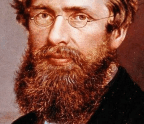Scottish superhero... or Italian coward?


The 1745 Jacobite Rebellion came to a bloody end on 16 April 1746 at Culloden Muir near Inverness. Throughout the battle, Charles Edward Stuart (better known to posterity as Bonnie Prince Charlie) had been among his hungry and exhausted troops, shouting encouragement. The prince’s prominence in the thick of it, surrounded by his horse guard, had made him a target for well-trained British-army gunners. Several officers nearby were wounded by the explosions, with one horse’s hind leg left hanging from the skin. Charles was unhurt, but his face and clothes were splattered with mud.
As the Jacobite lines collapsed, signalling a total rout, all observers agree that Charles, the 25-year-old Jacobite leader, left the battlefield accompanied by a small mounted guard and some of his senior advisers. But, beyond this, the prince’s escape has been a matter of great contention.
Colonel John William O’Sullivan, Charles’s most trusted friend and councillor, watched in dread as British Army cavalry moved across the field to cut off the prince’s retreat and implored him to retire immediately or be surrounded: “Well,” said the prince, “they won’t take me alive.” William Home, a 14-year-old ensign at the time, later described how Charles was compelled to leave the battlefield “with the utmost reluctance, the bridle of his horse having been seized and forcibly turned about”, in order to save him and the cause he embodied, his dynasty’s restoration. The defeat at Culloden - the first suffered by the Jacobite army during the entire nine-month campaign - was, in itself, a disaster, but the capture or death of the Stuart prince would have been a catastrophe.
Saving his skin
Others, however, far less sympathetic than O’Sullivan or Home, declared that, rather than standing firm with the intention to fight to the death, Charles refused point-blank to lead a last heroic charge. Worse still, he galloped off to save his own skin, to the terrible groans and screams of his injured and dying men. At this moment, in anger and despair,
You’re reading a preview, subscribe to read more.
Start your free 30 days



